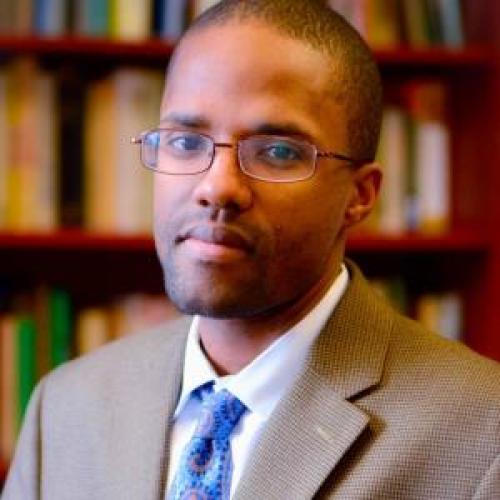Master of Arts (M.A.)
Economics
Duke University
2003

Omari H. Swinton, Ph.D. is a professor in the Economics department at Howard University where he teaches introductory, intermediate, and urban economics. He is currently the Director of Graduate Studies and Chair of the Economics Department. Additionally, he serves as Division Chair for the Social Sciences in the College of Arts and Sciences. His research interests include labor economics and education. He has papers examining the teenage labor market, the benefits from attending HBCU's, and the returns to a college education. He has a published a book on HBCUs titled “Vital and Valuable: The Relevance of HBCUs to American Life and Education.” He currently is working on projects that examine the returns to effort for students, the obstacles to faculty diversity in higher education, and benefits of attending an HBCU. He is the director of the AEA Summer Training Program and Scholarship Program which has increase the pipeline in the field of economics by preparing talented undergraduates for doctoral programs in economics and related disciplines. He is Vice President of the Board of Directors for the Phi Beta Sigma Federal Credit Union. Swinton owns a Right at Home Franchise in Baltimore, Maryland that was recognized for its performance as a President's Circle Member. He earned his B.S. from Florida A & M University in 2001, and his doctoral degree from Duke University in 2007.
Economics
Duke University
2003
Economics
Duke University
2007
Economics
Florida A&M University
2001
Omari H. Swinton (PI) , Haydar Kuban and William Spriggs (Co-PI), (2018) HBCU-UP/ EIR “Excellence in Research: A Comparison of Educational Outcomes at Institutions of Higher Education”, National Science Foundation, awarded ($499,932) (Collaborative proposal with Jackson State University total amount funded $998,688)
Omari H. Swinton (PI), William Spriggs and Gerald Daniels (CO-PI) AEA Summer Training program (2020) $1,500,000
Omari H. Swinton (PI) Amazon, AEA Summer Training program (2020) $685,000
Omari H. Swinton (PI) Andria Smyth (Co-PI) (2021) Alfred P. Sloan Foundation. The grant is to enhance the teaching and educational training of Black and other minority students pursuing degrees in economics. $1,423,003
Omari H. Swinton (PI), Gerald Daniels and Jevay Grooms (CO-PI) (2021) Broadening Participation in Economic: The American Education Association: Summer Program with Inclusive Mentoring, National Science Foundation $2,750,000
Read: Diverse Issues in Higher Education | Report Reveals a Differing Picture of Debt of HBCUs
Watch: WUSA9 | Will the strong job market continue and the economy keep growing?
Read: Truth Be Told News | Is Financial Literacy the answer to closing America’s Huge Racial Wealth Gap?
HBCUs and Economics—A Crucial Step in the Pipeline
While there are numerous studies, articles, and reports regarding the status and importance of HBCUs to the education of Black American students, little focus has been placed specifically on economics programs as these institutions. This article considers the production of economics baccalaureate degrees at HBCU economics programs to assess their actual and potential role in increasing and diversifying the supply of Black economists.
Barriers to Building Wealth among High - Income Black Earners
This study uses quantitative and qualitative methods to investigate the factors influencing engagement with financial advisors among high-income Black individuals. Results suggest that income is a pivotal determinant of seeking financial advice, while educational background and financial literacy show no significant impact. We also find that issues of trust and conflict of interest hinder this demographic's engagement with financial advisory services. These findings highlight the need for policies addressing racial income disparities and enhancing trust and transparency in financial institutions among Black high-income earners.
Comparative Analysis of Degree Pathways that Benefit Black College Students
The research by Hill, Kurban, Spriggs, and Swinton (2022) strongly supports the finding that, for the average black student, an HBCU is a positive factor in increasing the likelihood of graduation. To extend this previous research, our findings further suggest that HBCUs are increasingly important to a Black student’s ability to graduate in a STEM discipline. Utilizing a multinominal logistic model, this research finds that attending an HBCU increases the likelihood that a student will (1) graduate versus not graduate, (2) graduate in a STEM discipline, (3) graduate in a STEM discipline even if different than the original STEM discipline selected, and (4) graduate when changing from non-STEM to a STEM degree.
Vital and Valuable: The Relevance of HBCUs to American Life and Education
Historically Black colleges and universities (HBCUs) are a crucial element of higher education in the United States. In Vital and Valuable, two distinguished economists provide a groundbreaking empirical analysis of HBCUs and offer actionable policy recommendations.
Colleges and Upward Economic Mobility: The Distinctive Contribution of HBCUs
Relying on a panel of more than 600 four-year colleges (including 49 historically Black colleges and universities (HBCUs), we show that HBCUs as a group outperform other major classes of institutions (for example, flagship state universities) in generating upward economic mobility for their graduates.